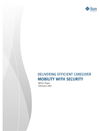 The trend in healthcare today is to enable patients to actively participate in their own care without worrying about exposing information to the wrong people. Today, Sun provides technology that can securely deliver clinical information to patients and providers on virtually any device. The technology offers secure access for providers at the point of care, whether as part of an office visit or at the patient's bedside. Because patient information is stored on centralized servers, there is less chance that it can be compromised if an individual device is stolen.
The trend in healthcare today is to enable patients to actively participate in their own care without worrying about exposing information to the wrong people. Today, Sun provides technology that can securely deliver clinical information to patients and providers on virtually any device. The technology offers secure access for providers at the point of care, whether as part of an office visit or at the patient's bedside. Because patient information is stored on centralized servers, there is less chance that it can be compromised if an individual device is stolen.
Mobility is enhanced because Sun solutions for healthcare providers employ contextsensitive data to switch information automatically, giving clinicians the ability to move from patient to patient without the need to spend time logging out, logging in, and reauthenticating between every patient. As a typical doctor makes his or her rounds through a large hospital, this could save up to an hour every day. Multiply that by all the healthcare employees who access patient data numerous times a day and the potential savings are enormous.
Finally, Sun's virtual desktop clients help preserve capital by eliminating the need to refresh desktops with each new application or operating system upgrade.
Download Delivering Efficient Caregiver - Mobility with Security (.pdf, 137KB)
For further information, please visit:
http://www.sun.com/solutions/landing/industry/health_care.xml